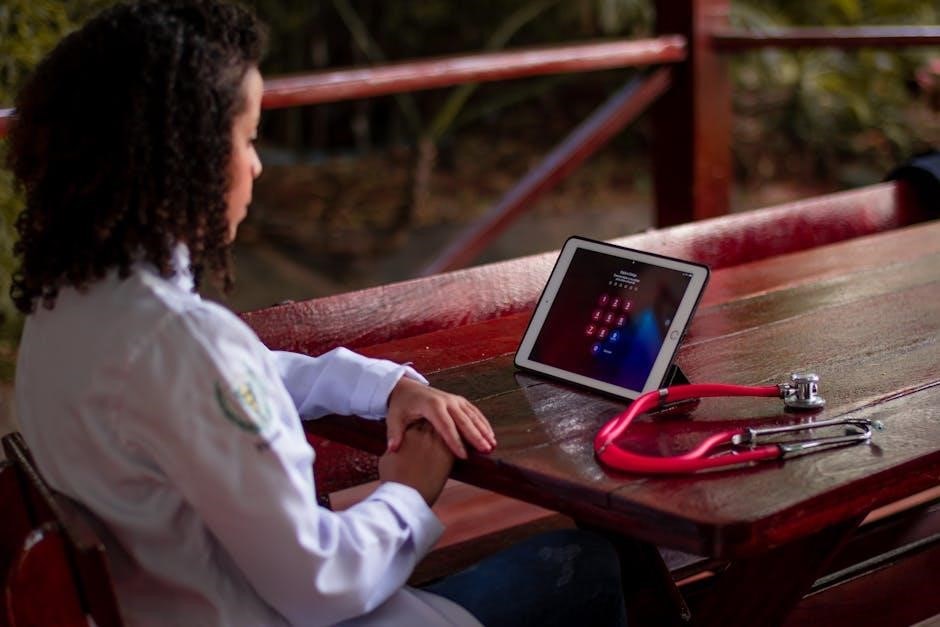Advanced pathophysiology is the scientific study of changes in normal physiological processes that cause or are associated with disease. It is crucial for nurse practitioners to understand disease mechanisms, enabling accurate diagnoses and targeted treatments. This foundation enhances clinical decision-making and personalized patient care, ensuring optimal health outcomes.
1.1 Importance of Pathophysiology in Nursing Practice
Pathophysiology is essential for nurse practitioners as it provides a deep understanding of disease mechanisms, enabling accurate diagnoses and effective treatment plans. This knowledge allows NPs to identify underlying causes, anticipate complications, and develop personalized care strategies. It serves as the foundation for clinical decision-making, ensuring evidence-based practice and improved patient outcomes.
1.2 Overview of Advanced Pathophysiology Concepts
Advanced pathophysiology explores complex cellular and molecular mechanisms underlying diseases. It examines how tissues respond to injury, inflammation, and repair processes. Understanding organ system adaptations and compensatory mechanisms is crucial for diagnosing and managing chronic conditions. These concepts are integrated with clinical presentations, enabling nurse practitioners to apply evidence-based practices and develop comprehensive care strategies tailored to patient needs.

Key Concepts in Advanced Pathophysiology
Advanced pathophysiology focuses on cellular mechanisms, tissue responses to injury, and inflammation. It explores organ system adaptations and compensatory mechanisms, providing a framework for understanding disease processes.
2.1 Cellular Mechanisms and Disease Processes
Cellular mechanisms underlie disease processes, involving disruptions in normal physiological functions. Genetic mutations, environmental factors, and inflammation can alter cellular behavior, leading to conditions like cancer and metabolic disorders. Understanding these processes is essential for diagnosing and managing diseases, enabling nurse practitioners to develop targeted interventions and improve patient outcomes effectively.
2.2 Tissue Responses to Injury and Inflammation
Tissue responses to injury and inflammation involve complex cellular and molecular mechanisms. Inflammation is a protective response aimed at restoring tissue homeostasis, but chronic or excessive inflammation can lead to tissue damage. Understanding these processes is critical for nurse practitioners to assess and manage conditions effectively, promoting wound healing and reducing complications in patient care.
2.3 Organ System Adaptations and Compensatory Mechanisms
Organ systems exhibit adaptive and compensatory mechanisms in response to physiological stress or disease. These mechanisms aim to maintain homeostasis and function, such as increased heart rate in shock or renal retention of fluid in dehydration. Understanding these responses is essential for nurse practitioners to diagnose and manage conditions effectively, ensuring timely and appropriate interventions for optimal patient outcomes.
Role of Nurse Practitioners in Patient Assessment and Diagnosis
Nurse practitioners play a critical role in patient assessment and diagnosis, utilizing advanced pathophysiology to identify health issues and develop targeted, evidence-based care plans effectively.
3;1 Integrating Pathophysiology into Patient Assessment
Integrating pathophysiology into patient assessment enhances diagnostic accuracy by linking symptoms to underlying disease mechanisms. Nurse practitioners use this knowledge to identify alterations in cellular and organ system functions, enabling precise diagnoses and targeted interventions. This approach fosters personalized care plans and improves patient outcomes.
By applying pathophysiological principles, NPs can better understand disease progression and develop evidence-based strategies, ensuring comprehensive and effective patient management.
3.2 Diagnostic Reasoning and Clinical Decision-Making
Advanced pathophysiology informs diagnostic reasoning by connecting symptoms to underlying biological mechanisms. Nurse practitioners analyze clinical data, patient history, and physical exam findings to identify disease patterns. By integrating evidence-based guidelines with pathophysiological insights, they develop accurate diagnoses and implement effective treatment plans. This process ensures timely, patient-centered care and improves health outcomes through precise clinical decision-making.

Pathophysiology of Major Organ Systems
This section examines the pathophysiology of major organ systems, detailing disease impacts on the cardiovascular, respiratory, neurological, gastrointestinal, renal, and endocrine systems for nurse practitioners.
4.1 Cardiovascular and Respiratory Systems
Cardiovascular and respiratory systems are interconnected, with pathophysiology often linking conditions like heart failure and chronic obstructive pulmonary disease. Understanding mechanisms such as ischemia, hypertension, and gas exchange abnormalities is critical for nurse practitioners to diagnose and manage conditions effectively, ensuring precise interventions and improved patient outcomes in these vital systems.
4.2 Neurological and Gastrointestinal Systems
The neurological and gastrointestinal systems are complex, with pathophysiology often involving interconnected mechanisms. Nurse practitioners must understand disorders like neurodegeneration, seizures, and gastrointestinal motility issues; Advanced knowledge enables accurate diagnoses and targeted interventions, improving patient outcomes and quality of life through evidence-based care and personalized treatment plans tailored to these intricate systems.
4.3 Renal and Endocrine Systems
The renal system regulates electrolytes, fluids, and waste, while the endocrine system controls hormones essential for metabolism and homeostasis. Pathophysiological changes in these systems can lead to conditions like diabetes, thyroid disorders, and kidney disease. Understanding these mechanisms is vital for nurse practitioners to diagnose and manage disorders effectively, ensuring optimal patient care and improved health outcomes through targeted interventions;

Advanced Clinical Decision-Making and Evidence-Based Practice
Advanced clinical decision-making integrates patient data, research evidence, and practice guidelines to refine care. Evidence-based practice ensures interventions are grounded in current, reliable science, improving patient outcomes.
5.1 Applying Pathophysiology to Clinical Practice
Applying pathophysiology to clinical practice involves using knowledge of disease mechanisms to guide accurate diagnoses and targeted interventions. Understanding physiological changes enables nurse practitioners to develop personalized treatment plans, improving patient outcomes. This approach aligns with evidence-based practices, ensuring care is grounded in scientific research and clinical expertise, while addressing the unique needs of each patient effectively.
5.2 Role of Evidence-Based Practice in Nursing
Evidence-based practice integrates the best available research, clinical expertise, and patient preferences to guide nursing decisions. It enhances care quality, consistency, and patient outcomes by ensuring interventions are grounded in proven methods. Nurse practitioners use evidence-based practices to stay updated on advancements, improve safety, and deliver high-standard care tailored to individual patient needs, fostering trust and better health outcomes.

Emerging Trends and Technologies in Pathophysiology
Emerging trends include telehealth integration, genetic advancements, and AI-driven diagnostics, revolutionizing how pathophysiology is studied and applied. These technologies enhance disease understanding and personalized care delivery;
6.1 Impact of Telehealth on Pathophysiology Education
Telehealth has revolutionized pathophysiology education by enhancing accessibility and flexibility. Virtual platforms enable remote learning, interactive simulations, and real-time data sharing, fostering a dynamic understanding of disease mechanisms. This approach not only bridges geographical gaps but also allows nurse practitioners to engage in continuous, high-quality education, adapting to emerging trends and technologies in healthcare.
6.2 Role of Genetic and Molecular Biology in Advanced Practice
Genetic and molecular biology play a pivotal role in advanced nursing practice by enabling personalized care. Understanding genetic factors and molecular mechanisms allows nurse practitioners to identify predispositions, tailor treatments, and predict disease progression. These advancements enhance diagnostic accuracy, therapeutic interventions, and patient outcomes, integrating genomics into clinical decision-making for holistic care.

The Future of Advanced Pathophysiology in Nursing
The future of advanced pathophysiology in nursing lies in integrating cutting-edge research, technology, and personalized care. Technological advancements and evidence-based practices will drive innovation, enhancing patient outcomes and nursing education.
7.1 Advancements in Nursing Education and Training
Advancements in nursing education and training are revolutionizing how future nurse practitioners learn and apply advanced pathophysiology. Institutions are adopting innovative teaching methods, including virtual simulations and AI-driven tools, to enhance understanding of complex disease processes. These technologies allow for personalized learning experiences, ensuring nurse practitioners gain the expertise needed to address diverse patient needs effectively.
Furthermore, the integration of evidence-based practices and competency-based progression in curricula is preparing nurses to stay ahead in a rapidly evolving healthcare landscape. Collaborative learning opportunities and interdisciplinary training are fostering a deeper understanding of pathophysiology, enabling nurse practitioners to deliver high-quality, patient-centered care with precision and confidence.
7.2 Challenges and Opportunities for Nurse Practitioners
Nurse practitioners face challenges such as complex patient cases, evolving regulations, and the need for continuous education. However, advancements in pathophysiology offer opportunities to enhance diagnostic accuracy and personalized care. Expanding roles in underserved areas and integrating technology, like clinical decision support systems, further empower NPs to deliver high-quality, evidence-based care, addressing healthcare disparities and improving patient outcomes effectively.

Resources for Advanced Pathophysiology Education
Advanced pathophysiology education relies on textbooks, online courses, and research articles. These resources provide in-depth knowledge, clinical case studies, and evidence-based practices, enhancing nurse practitioners’ expertise and decision-making skills.
8.1 Recommended Textbooks and Online Courses
Essential textbooks include Pathophysiology: The Biologic Basis for Disease in Adults and Guyton and Hall Textbook of Medical Physiology. Online platforms like Coursera and NursePractitionerSchools.com offer courses that deepen understanding of advanced pathophysiology concepts.
These resources provide comprehensive insights into disease mechanisms, diagnostic reasoning, and evidence-based practice, ensuring nurse practitioners can apply knowledge effectively in clinical settings.
8.2 Role of Research in Advancing Nursing Practice
Research plays a pivotal role in advancing nursing practice by providing evidence-based guidelines that inform clinical decision-making. It fosters innovation, improves patient outcomes, and enhances professional development. Nurse practitioners can leverage research findings to stay updated on best practices, ensuring high-quality, patient-centered care. Continuous engagement with research promotes lifelong learning and the evolution of advanced nursing roles.

Clinical Applications of Pathophysiology in Nursing
Clinical applications of pathophysiology enable nurses to diagnose conditions, develop care plans, and monitor treatment effectiveness. Understanding disease mechanisms at the cellular and organ levels informs personalized care and improves patient outcomes through evidence-based practice.
9.1 Case Studies and Real-World Examples
Case studies provide practical insights into applying pathophysiology in nursing. Real-world examples, such as managing cardiovascular or respiratory conditions, illustrate how understanding disease mechanisms informs assessment and care. These scenarios help nurse practitioners develop targeted interventions, enhancing patient outcomes through evidence-based decision-making and personalized treatment plans.
9.2 Best Practices for Integrating Pathophysiology into Patient Care
Best practices include conducting thorough patient assessments, utilizing clinical decision support systems, and documenting care plans. Collaborative communication and evidence-based interventions enhance care quality. Nurse practitioners should prioritize patient-centered approaches, integrating pathophysiological knowledge to address complex conditions effectively. Regular updates on emerging trends ensure optimal care delivery and improved health outcomes for diverse patient populations.
Ethical Considerations in Advanced Nursing Practice
Ethical considerations involve respecting patient autonomy, confidentiality, and justice. Nurse practitioners must adhere to professional standards, ensuring beneficence and non-maleficence in care delivery, upholding trust and integrity.
10.1 Ethical Implications of Advanced Pathophysiology
Advanced pathophysiology raises ethical considerations, such as balancing patient autonomy with beneficence. NPs must ensure informed consent, maintain confidentiality, and avoid harm while applying complex scientific knowledge. Ethical dilemmas arise in diagnostic accuracy and treatment decisions, emphasizing the need for professional integrity and adherence to legal standards to uphold patient trust and deliver equitable care.
10.2 Legal and Professional Responsibilities
Nurse practitioners must adhere to legal frameworks, such as the Texas Nursing Practice Act, ensuring their practice aligns with state and federal regulations. Maintaining professional standards, including confidentiality and informed consent, is crucial. They must also stay updated on evidence-based guidelines and avoid practices that could lead to medical errors or legal consequences, upholding their professional integrity and patient trust.

The Impact of Advanced Pathophysiology on Patient Outcomes
Advanced pathophysiology enhances nurse practitioners’ understanding of disease mechanisms, improving patient care and outcomes. It enables accurate diagnosis, targeted interventions, and personalized treatment plans, leading to better health results.
11.1 Improving Patient Care Through Advanced Knowledge
Advanced pathophysiology equips nurse practitioners with a deeper understanding of disease mechanisms, enabling precise diagnoses and effective treatment plans. This knowledge allows for tailored interventions, enhancing clinical decision-making and patient outcomes. By integrating pathophysiological principles, NPs can address complex conditions more effectively, ensuring personalized and evidence-based care that improves patient health and well-being.
11.2 Measuring the Effectiveness of Pathophysiology Education
Evaluation of pathophysiology education involves assessing knowledge retention, clinical application, and improved patient outcomes. Competency-based assessments, such as exams and simulations, measure understanding. Feedback from patients and peers evaluates practical application. Long-term impact is gauged through patient care quality improvements and reduced complications, ensuring educational strategies align with advancing nursing practice and enhancing clinical proficiency.
Advanced pathophysiology is foundational to nursing practice, enhancing diagnostic accuracy and patient outcomes. Continuous learning and integrating evidence-based practices are essential for optimal care.
12.1 Summary of Key Concepts
Advanced pathophysiology provides a deep understanding of disease mechanisms, enhancing nurse practitioners’ ability to diagnose and manage conditions effectively. It integrates cellular, tissue, and organ system responses, enabling personalized care. Evidence-based practices, clinical decision-making, and emerging technologies are emphasized to improve patient outcomes. This knowledge is crucial for addressing complex health issues and advancing nursing practice in diverse settings.
12.2 Encouraging Lifelong Learning in Advanced Pathophysiology
Lifelong learning is essential for nurse practitioners to stay updated on advancements in pathophysiology. Engaging in continuous education through textbooks, online courses, and research ensures clinical competence. Staying informed about new technologies and evidence-based practices fosters professional growth and enhances patient care. Encouraging curiosity and a commitment to learning supports the evolution of advanced nursing practice and improves patient outcomes.

Leave a Reply